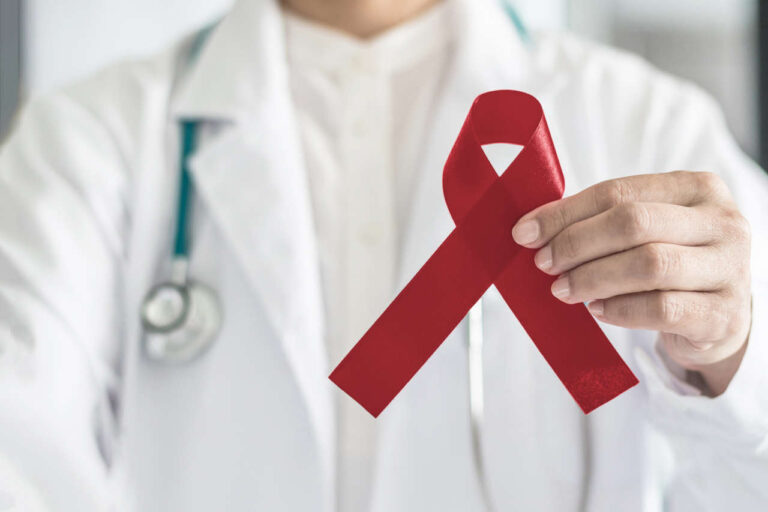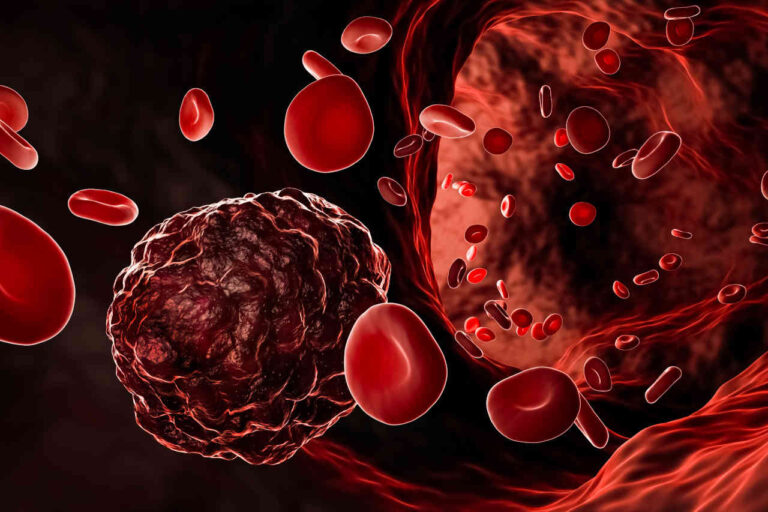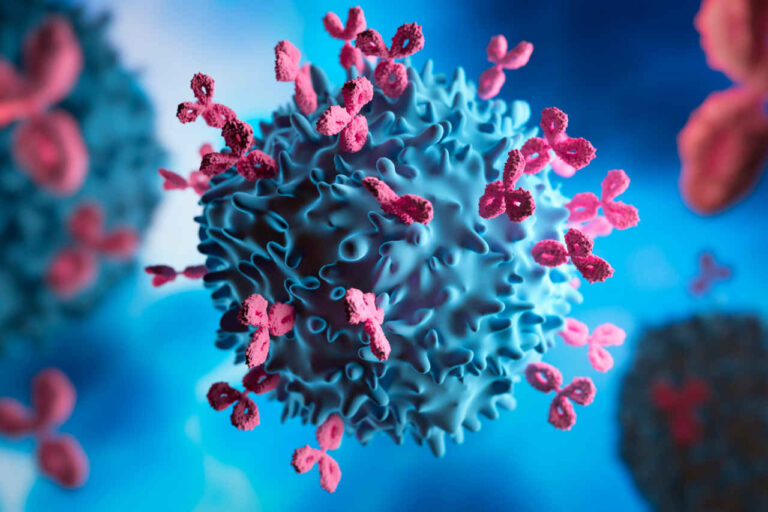
Kanjinti was first approved by the FDA in 2019 as a biosimilar of an already-marketed anticancer drug called Herceptin. It is classified under the pharmacologic category of antineoplastic, monoclonal antibodies, and anti-HER2 drug agents. The active substance of Kajinti is “trastuzumab-anns.”
This medication is intended to slow the growth of HER2 overexpressing metastatic gastric cancer and breast cancers (early and metastatic) in adults. HER2 cancers typically begin when the HER2 proteins grow and divide in an uncontrollable way leading to an overexpression of these proteins.
What Is Kanjinti Used To Treat?
Kanjinti has been approved for the labeled indications of metastatic gastric or gastroesophageal junction adenocarcinoma cancer, as well as breast cancer (both early and metastatic forms).
Kanjinti may be prescribed under the following conditions:
- In early breast cancer (where the cancer is localized within the breast and does not spread beyond the breast or lymph nodes to the other body parts). Kanjinti may be initiated after surgery, chemotherapy, and radiotherapy. It can be used as a single agent (if a patient has previously received chemotherapy) or combined with other chemotherapy drugs such as paclitaxel or docetaxel.
- In metastatic breast cancer (where the tumor has spread to other body parts), Kanjinti may be used alone if no other treatment has been shown to be effective. It can also be used in patients who have received one or more chemotherapy sessions. If patients have not received chemotherapy or any other therapy before, Kanjinti is used in combination with chemotherapy medicines (e.g., paclitaxel).
- In metastatic gastric (stomach) cancer, Kanjinti can be used alone or in combination with other chemotherapy drugs (cisplatin and capecitabine), especially in patients who have not received any prior treatment.
How Does Kanjinti Work?
HER2 is a growth-promoting protein that is present on the surface of normal healthy cells and cancer cells. However, in the case of cancer cells, the HER2 proteins are overly active and send strong signals to cancer cells via their HER signaling pathway. Upon receiving signals from HER2, cancer cells produce molecules that promote blood vessel growth, which helps feed tumors by providing nutrients.
Kanjinti works to block the signaling mechanism of HER2 and prevent tumor growth.
Mechanism of Action
Kanjinti contains an active substance, “trastuzumab-anns,” a recombinant monoclonal antibody designed to recognize and attach to the HER2 protein. It then produces an antibody-dependent cellular toxic pathway, not allowing the HER2 cells to multiply and become overexpressed. Kanjinti also attracts the immune cells to attack and kill the cancer cells.
In Which Cancer Patients Is Kanjinti Used?
Kanjinti can only be used in patients whose tumor tested HER2 positive due to large quantities of HER2 proteins that express on cancer cells and help cells to grow uncontrollably and spread rapidly.
HER2 overexpressed in 25% to 30% of human breast cancer. HER2 overexpression is typically found in both early and metastatic cancer.
Is Kanjinti the Same as Herceptin?
Kanjinti is a biosimilar of Herceptin, which means it is a highly similar version of the original branded medication (Herceptin). Kanjinti shares the same attributes as Herceptin in terms of structure, mode of action (biological activity), purity, and potency (safety and efficacy).
There is no clinically meaningful difference between Kanjinti and Herceptin. Kanjinti has the same mechanism of action, benefits, and side effects as Herceptin.

Dosage Form and Strengths
Kanjinti is available in white to pale yellow powdered form in a vial for injection purposes and can only be obtained with a doctor’s prescription. This powder is dissolved in sterile water prior to administration.
Kanjinti is available in a single-dose vial of 150 mg strength (containing 150 mg of Kanjinti) and a multiple dose-vial of 420 mg (containing 420 mg of Kanjinti).
Dosage and Schedule
The dosage of Kanjinti is different for gastric cancer and breast cancer (both early and metastatic). The doses of Kanjinti are adjusted in these patients according to the following criteria:
- Patient’s body weight
- Expression of HER2 proteins
- Treatment plan: Will Kanjinti be given alone or in combination with adjuvant treatment (such as chemotherapy)?
- Treatment frequency: Will Kanjinti be given once weekly or once every three weeks?
Dosage for Early Breast Cancer
The recommended initial dose of Kanjinti for patients with early breast cancer who are also receiving chemotherapy is 4 mg/kg given intravenously for 90 minutes.
- Initial dose: If the first dose is well tolerated, then the IV infusion time is shortened to 30 minutes with a subsequent dose of 2 mg/kg weekly during chemotherapy for the first 12 weeks (for patients taking docetaxel or paclitaxel) or 18 weeks (for patients taking carboplatin and docetaxel).
- Patients usually complete a total of 52 weeks of therapy.
Dosage for Metastatic Breast Cancer
The initial dose of Kanjinti alone or in combination with paclitaxel is 4 mg/kg for 90 minutes of IV infusion, followed by the subsequent dose of 2 mg/kg every week for 30 minutes until disease progression.
Dosage for Metastatic Gastric Cancer
The starting dose of Kanjinti alone is 8 mg/kg over 90 minutes, followed by the subsequent dose of 6 mg/kg every 3 weeks for over 30 to 90 minutes until disease progression.
How Is Kanjinti Used?
Kanjinti is given intravenously over 90 minutes either once weekly or once every 3 weeks to patients with breast cancer and once every 3 weeks to patients with metastatic gastric cancer.
Early breast cancer patients receive Kanjinti infusion for a year (52 weeks), while metastatic breast and gastric cancer patients receive infusions as long as this treatment remains effective.
Is Kanjinti a Chemotherapy Drug?
No, Kanjinti is an immunotherapeutic drug (antibody), but it is also used in combination with chemotherapy drugs, such as paclitaxel, to get better results.
Side Effects
Listed below are some of the common adverse side effects patients may experience during or after receiving an infusion of Kanjinti.
In metastatic breast cancer settings, the most common side effects experienced by 10% or more of the patients include:
- Fever, chills, and cough
- Congestive heart failure
- Infections, headache, fatigue
- Vomiting and diarrhea
- Rash
In metastatic gastric cancer settings, the most common side effects experienced by 10% or more of the patients include:
- Neutropenia, anemia
- Fever, diarrhea, weight loss
- Stomatitis
- Upper respiratory tract infections
- Low platelet count (thrombocytopenia)
- Changes in taste (dysgeusia)
- Mucosal inflammation
- Nasopharyngitis
In severe and adverse cases, the following may occur:
- Pulmonary toxicity (damage to lungs)
- Embryo-fetal toxicity (usually occurs in patients who are pregnant and receiving Kanjinti infusion)
- Cardiomyopathy
- Chemotherapy-induced neutropenia exacerbation
Precautions
You must not start Kanjinti if:
- You are pregnant or intend to become pregnant, as Kanjinti can cause embryo-fetal toxicity and may harm your unborn baby.
- You are Breastfeeding or planning to breastfeed, as Kanjinti can harm your newborn baby.
- You have had a previous severe allergy to trastuzumab-anns.
- You have a previous history of heart disease (such as coronary heart disease, heart failure and angina).
- You have a breathing or blood pressure problem.
- You have previously been treated with anthracyclines (e.g., doxorubicin).
- You are taking any other prescription medications or herbal products.
Cost
The cost of Kanjinti therapy may vary depending on your insurance plan, duration of treatment based on diagnosis, and recommended dose per treatment.
An estimated cost of Kanjinti intravenous powder (150 mg) for one injection is around $1,442, and $4,019.52 for 420 mg.
REFERENCES:
- US Food and Drug Administration. Kanjanti Prescribing information. https://www.accessdata.fda.gov/drugsatfda_docs/label/2019/761073s000lbl.pdf
- Kanjanti prescribing information https://www.medicines.org.uk/emc/product/9233/smpc#gref
- Dhillon, S. (2018). ABP 980: A Trastuzumab Biosimilar. BioDrugs, 32(5), 511–514. https://doi.org/10.1007/s40259-018-0305-2
- Kanjinti 150 mg powder for concentrate for solution for infusion – Summary of Product Characteristics (SmPC) – (emc). (n.d.). https://www.medicines.org.uk/emc/product/9233/smpc
- Trastuzumab (Kanjinti) Drug Information. (n.d.). https://www.ucir.org/immunotherapy-drugs/trastuzumab-2
- https://www.pi.amgen.com/-/media/Project/Amgen/Repository/pi-amgen-com/Kanjinti/kanjinti_pi.pdf












